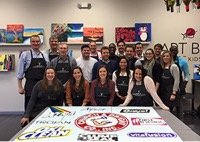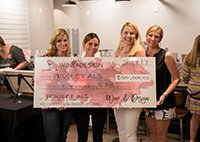
Originally published on Inc.com: Scroll down to advice #6 to read what CEO of Wine & Design had to say!
Advice CEOs Wish They'd Gotten Before Their First Job
12 successful entrepreneurs share what they wish they'd known before they started their first job.
Contributing editor, Inc.com@Sales_Source

CREDIT: Getty Images
I have absolutely no advice for people starting their first jobs, since my first paying job was playing electric bass in a rock band. All I learned was that musicians perform better when they show up sober.
Because I've got nothing on this subject, here's some advice from successful entrepreneurs. A couple of quick observations, though.
First, note that two of these successful CEOs started out in Sales. As I've pointed out previously, working in Sales is great training to be an entrepreneur and also can help you break into an industry that interests you.
Second, if there's unifying theme in the advice below, it's that your future will be built on the people you meet more than the skills you acquire. So true, so true…
1. Make friends and maintain the relationships.
Entrepreneur: Natasha Case, CEO and Founder of Coolhaus
Her first job: Architect at Disney Imagineering
Her advice: "Your beginning work experiences are not only about the skills you will learn, the projects you will become a part of, but are very much about the foundation of your community and professional relationships. I was able to foster incredible and long-lasting relationships at my first job, Disney Imagineering. These are individuals who have remained friends and helped me in the early days of Coolhaus, rooted for us as we have grown and now are loyal customers and clients of our products and services. People do business for people, so it's important to remember that with your most important partners in business and because you never know where you'll encounter them again!"
2. Create your own opportunities.
Entrepreneur: Mike McEwan, CEO of Jane.com
His first job: Dishwasher
Her advice: "My first job was a dish washer. I wish I would have known that I could've advanced from being a dishwasher faster than I did. I just didn't ask about other opportunities after I had proven myself. I realized that it's necessary to be assertive. You have to start perceiving your happiness and satisfaction in your job as your own entrepreneurial endeavor. Being your own boss doesn't just mean running your own company. It means taking control of what happens to you at work. And that starts with asking for a promotion or raise.. or else you'll always just be a dishwasher."
3. Learn and respect the entire business.
Entrepreneur: Jon Sebastiani, CEO of Sonoma Brands
His first job: Vineyard worker
His advice: "I've learned that no matter how big or small your organization is, having respect for every level of production is the greatest asset to any culture. I've been incredibly fortunate to spend my career in the wine and food business, and some of the most important lessons I've ever learned were in the vineyards, working the grapevines at 9 years old. Respect fosters collaboration, synergy and cooperation which are all essential ingredients for creating an environment that values productivity, performance and quality."
4. If you don't fit in, quit.
Entrepreneur: Vincent Kitirattragarn, CEO of Dang Foods
His first job: Municipal government
His advice: "I wish someone told me to only stay in a job if I'm constantly learning. My employer, a large municipality, had a culture of stagnation and complacency, with zero incentive to learn or work hard. I eventually learned it wasn't a good fit, but it took longer than it should have. Some workplaces embrace employee learning more than others, and the ones that do, are the places where you'll be able to grow in your career and in life."
5. Don't let work consume your life.
Entrepreneur: Landon Eckles, CEO and Co-Founder of Clean Juice
His first job: Pharmaceutical sales
His advice: "I think most young graduates coming out of school think they need to conquer the world, as I did. My advice to them would be to of course work hard, but don't forget about what matters to you in your life besides your career. I wish I knew how to balance my ambition and will to succeed with my home life. I was already married, had one child and had another on the way when I graduated college. I knew that I needed to support my young family, and thought that only meant monetarily. I was hired directly into pharmaceutical sales and would do anything for my next sale – work long hours, do multiple dinners out a week with clients, and do home office work on the weekends. We now have 5 children and I realize that my family needs much more than financial support – they need my love, my time and presence."
6. Get a mentor and take some extra classes.
Entrepreneur: Harriet Mills, CEO and Founder of Wine & Design
Her first job: Sales Rep
Her advice: "I wish I knew what I had and what it all could've been. Thrown into my first job as a sales rep, I didn't have a mentor or teacher to really motivate to my fullest potential. Although I tried by hardest in learning day in and out of the job, I wish I had studied a bit more, taken a few classes or even read up on a few books that would've made me THE best at the job."
7. Don't try to do everything yourself.
Entrepreneur: Bart Silvestro, CEO of Chef's Cut Real Jerky
His first job: Bread delivery driver at Kraft Foods
His advice: "I look back and wish I would have known that it is okay not to try to do it all and how important the team you surround yourself is to your own success. My first professional job was driving a bread delivery route in Kraft Foods' bakery division. After 6 months, I was promoted to managing the regional delivery division. I would often still drive the delivery route in the morning, followed by working in the office until 7 or 8 pm, pulling 17 to 18 hour days. At the time, I was trying to do it all and ended up running my body physically and mentally down to where I would fall asleep sitting up. It is critical to hire and invest in great employees, and then trust that they will do the job you assign them. This allows you the time to think bigger picture, but also builds a culture of ownership that ultimately adds to the success of the company."
8. Suggest improvements (diplomatically).
Entrepreneur: Joe Schumacher, CEO of The Goddard School
His first job: Warehouse janitor
His advice: "My first job was as a janitor in a warehouse. I was about 12. I wish I had known two things: (1) that people can get so invested in their own processes that it's difficult for them to see how those processes have become outdated or can be improved and (2) that in those situations patience and diplomacy are critical to having suggestions for improvement even considered, much less accepted. Had I known these two things then, I might not have been unceremoniously fired after just a few weeks and, with hard work and dedication, might now be the head of the janitorial department there."
9. Don't give up after initial failures.
Entrepreneur: David Westendorf, CEO of ThinOPTICS
His first job: Assistant at a fresh produce distribution company
His advice: "Recruited for my first job at the end of fifth grade by none other than my father, I learned that a lot of people rarely get an idea right the first time, which can be a frustrating thing to learn. We went through three different business models before we nailed it with his fresh produce distribution company. To this day, I believe perseverance is critical in building a business."
10. Put people before profits.
Entrepreneur: Young Lee, CEO and Founder of The Flame Broiler
His first job: Life insurance agent
His advice: "Something I wish I knew at my first job as a life insurance agent would be to put community before commerce. Initially when I started out in my career, I was so focused on turning a profit, I missed a lot happening around me. After becoming sick and re-focusing my priorities to become well again, it was then that I became determined to help others in the same way. When you're good at what you do, happy while doing good in the world, eventually the blessings will follow. Always put others ahead of yourself, because your community is more important than any commercial value you will reap."
11. Remain open to new possibilities.
Entrepreneur: Steve Jackson, CEO of Hungry Howie's Pizza
His first job: Pizza delivery boy
His advice: "If there was one thing I wish I knew in my first job it would be that you never know where your future will go, so it's important to make every relationship a positive networking experience. My first real job after high school was delivering pizza for a local pizza shop owned by Jim Hearn, who later opened the first Hungry Howie's. Although my original career goal was to be a teacher, it didn't pan out and I ended up returning to work with Jim, opening the second Hungry Howie's Pizza location and further developing the brand."
12. Never forget where you came from.
Entrepreneur: Ryan Farr, CEO and Founder of 4505 Chicarrones
His first job: Dishwasher and busboy
His advice: "At my first job as a dishwasher bussing tables for a patty melt from the chef, it taught me the lesson of being humbled by where you come from and that if you're dedicated and determined you can work your way up. Now, as a business owner of a restaurant and CPG brand, I can truly appreciate and respect the hard work that is put in by every single person on my team."
The opinions expressed here by Inc.com columnists are their own, not those of Inc.com.

 Private Events
Private Events Art Buzz Kids
Art Buzz Kids Team Building
Team Building D.I.Y.
D.I.Y. On Wheels
On Wheels Paint It Forward
Paint It Forward







